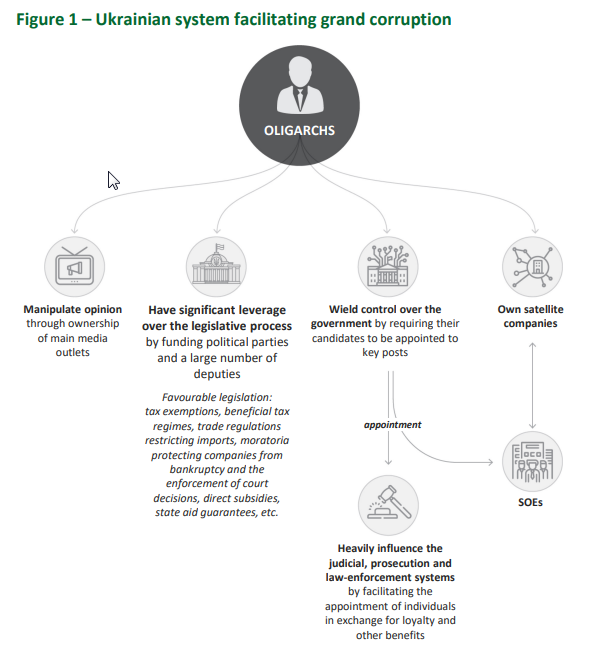Grand corruption and state capture are still widely spread in Ukraine, and EU support and measures have not yielded the expected results, a report by the European Court of Auditors states.
'The European External Action Service and the Commission have viewed corruption as a cross-cutting priority, and channelled funds and efforts through a variety of sectors. Overall, we found that this approach focused insufficiently on grand corruption," says the report, which audited whether the European External Action Service and Commission have effectively supported judicial and anticorruption reforms in Ukraine during 2016-2019.
Grand corruption is defined as the abuse of high-level power that benefits the few, and causes serious and widespread harm to individuals and society, hindering competition and growth, and harming the democratic process. The European Court of Auditors sees oligarchs and vested interests as the root cause of this corruption.
"While the EU has helped to reduce corruption opportunities, grand corruption remains a key problem in Ukraine. Judicial reform is experiencing setbacks, anti-corruption institutions are at risk, trust in such institutions remains low, and the number of convictions resulting from grand corruption is small," says the report.
It details that although the European External Action Service and the Commission have viewed reducing corruption as a cross-cutting issue, they have not designed and implemented a specific strategy to tackle grand corruption.
The report finds that the Commission’s support for civil-society projects and independent journalism
was a relevant course of action, that the Commission supported the Antimonopoly Committee’s activities and corporate governance reforms of State-Owned Enterprises, as well as with judicial reform and setting up specific anti-corruption institutions.
"However, we found that the existing environment in Ukraine puts the sustainability of these institutions at risk, as they still rely on the unreformed judicial, prosecution and law-enforcement sectors," the report notes.
It states that tens of billions of dollars are lost annually as a result of corruption in Ukraine.

It is also noted that the EU has long known about the links between oligarchs, high-ranking officials, politicians, the judiciary, and state-owned enterprises. However, the auditors note that he has not developed a realistic strategy to combat high-level corruption:
"Grand corruption and illicit financial flows, including money laundering, are intrinsically linked, but the projects we audited contained a very small number of activities addressing money laundering risks."
The auditors touch upon the visa-free regime with the EU that Ukraine received in 2017. They find that the Commission had an over-positive assessment of Ukraine's progress in the anti-corruption sector: while one of the three anti-corruption benchmarks for the visa liberalisation action plan was achieved,
the other two were only partially achieved. Nevertheless, this did not lead to the visa-free system being reconsidered.
Summing up, the Commission recommends:
- Designing and implementing specific actions that target grand corruption, including a strategic document with key actions to take. Here, the Commission also suggests preventing oligarchs from entering the EU and using their assets there;
- Assessing and adjusting the scale of its support for civil society organisations and investigative journalism;
- Contributing to removing impediments to free and fair competition, including avoiding supporting companies under oligarchic influence and support efforts to dismantle monopolies;
- Improving its monitoring and public reporting system;
- Emphasise integrity and commitment to reform when providing capacity-building support for institutions;
- Support the digitalisation of registers;
- include strict requirements for reforming the judiciary, prosecution services, and law enforcement agencies for Commission support.
“Despite varied support the EU has offered to Ukraine, oligarchs and vested interests continue to undermine the rule of law in Ukraine and to threaten the country’s development. Ukraine needs a focused and efficient strategy to tackle the power of oligarchs and diminish state capture. The EU can play a much more significant role than it has done so far," said Juhan Parts, a member of the European Chamber of Auditors responsible for the report.
Putting the anti-corruption reform at risk, on 27 October 2020, the Constitutional Court of Ukraine ruled that a number of provisions of anti-corruption legislation on criminalizing illicit enrichment are incompatible with the Constitution and declared some of its provisions unconstitutional.
Now, Ukraine risks losing the support of the IMF, the World Bank, and other international partners is unconstitutional because the Constitutional Court declared unconstitutional liability for submitting false asset declarations and the powers of the National Agency on Corruption Prevention. As well, this calls into question the visa-free regime with the EU.
On December 4, the Verkhovna Rada resumed criminal liability for false declarations; now, lying about assets is punishable by a fine and imprisonment.
The EU stated that it believes these measures are an insufficient safeguard.
Related:
- (Anti-)Constitutional Court of Ukraine: why it declares the best reforms unconstitutional instead of protecting the Constitution
- Ukraine ponders ways to stop “legal terrorists” in Constitutional Court
- Why post-Euromaidan anti-corruption reform in Ukraine is still a success
- How Ukraine can tame its “judicial mafia”
- Reforming judiciary in focus of Ukraine’s first high-level non-oligarchic international conference





